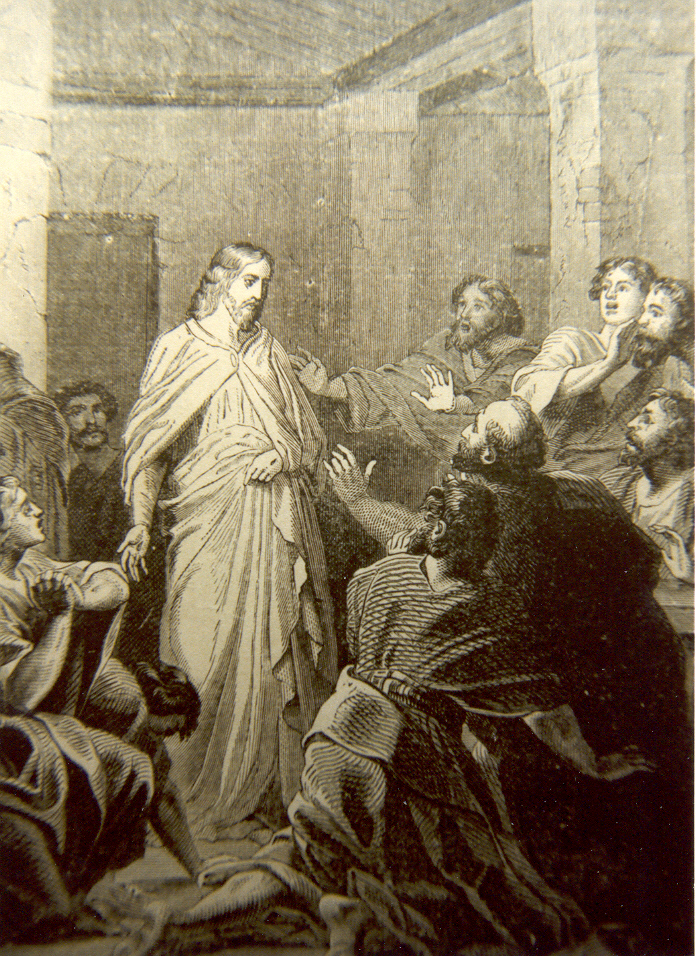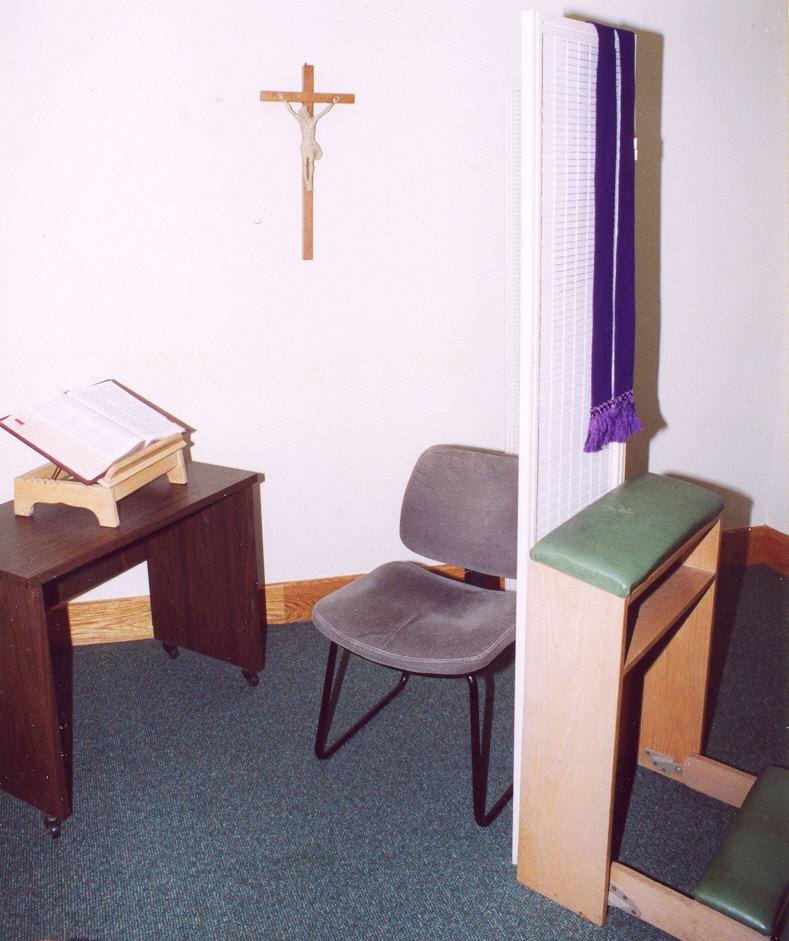
Return to
Index The Catholic Faith
Return to
Level Three Topic Index
Home Page
God calls each one of us to receive new life in him, the life of sanctifying grace. We first received this life in the holy waters of Baptism, which takes away sin and makes us temples of the Holy Spirit. But what about the sins we commit after Baptism? How can we be washed clean again? By the wonderful sacrament of Penance (also called Reconciliation or Confession) - the gift of God's love and mercy to his people.

On the night he rose from the dead, Jesus appeared to his apostles and gave them the priestly power to celebrate this sacrament. Saint John, who was an eyewitness at this event, describes it for us: On the evening of the first day of the week, even though the disciples had locked the doors of the place where they were for fear of the Jews, Jesus came and stood before them. "Peace be with you", he said. When he had said this, he showed them his hands and his side. At the sight of the Lord the disciples rejoiced. "Peace be with you", he said again. "As the Father has sent me, so I send you." Then he breathed on them and said: "Receive the Holy Spirit. If you forgive men's sins, they are forgiven them: if you hold them bound, they are held bound." (Jn 20:19-23)
By these words Jesus gave the apostles the power to forgive sins, something only God can do! How can this be? Because Our Lord shared with them his mission as Savior. They were to go throughout the world forgiving sins just as he had done. Christ had shared his teaching authority with them and also gave them the power (at the Last Supper) to change bread and wine into his Body and Blood, so now he gives them the power to forgive sins. Saint Paul reminded the early Christians about this power of the priesthood: "All this has been done by God, who has reconciled us to himself through Christ and has given us the ministry of reconciliation. . . This makes us ambassadors of Christ, God as it were appealing through us" (2 Cor 5:19-20).
Understanding the Sacrament of Penance
We can better understand this sacrament by looking more closely at the words Jesus used when he gave it to the Church.
"Peace be with you": This tells us that Jesus was giving the sacrament as a way to have true peace in our lives. Through it he takes away our sins. This helps us to free our guilty conscience which robs the soul of inner peace.
"As the Father has sent me": This reminds us that Jesus was the ambassador of God the Father. An ambassador is someone who is sent by someone else with an important message to deliver. The message Jesus brought to us was the Good News of salvation - the truth that we can be saved from our sins and from Hell if we follow him.
"So I send you": This reminds us of the passage we just read from Saint Paul, where he calls himself and the other priests "Ambassadors of Christ". As the Father had sent Jesus to take away sins, so now Jesus sends his priests to do the same thing.
"Receive the Holy Spirit": Remember that in the Sacrament of Confirmation the Spirit is full of power. This is the power of God which alone can take away sins. When we go to Confession, the priest forgives our sins by the power of the Holy Spirit. He cannot do this on his own because he is a sinful man just as we are, but as a priest he has this power.
"If you forgive men's sins, they are forgiven them": This tells us that Jesus did give the ministry of forgiveness and reconciliation to the apostles. They, in turn, passed this work on to other priests down to our own day. We do not have to wonder whether God forgives us when we go to Confession, for we have Jesus' word that he does!
"If you hold them bound, they are held bound": This reminds us that the priest can also refuse to forgive us our sins. If he asks us to give up a sinful action and we say "no", then he will not give us absolution. Why? Because this shows that we are not really sorry for the sin; we still want to commit it. Our sins can be forgiven only if we are truly sorry and promise to avoid them in the future.
The Sign and Effects of Penance
As with all the sacraments, Penance has its own sign. The sign of Penance is, first, the confession, or telling of sins to the priest, and, second, the words of absolution, or forgiveness, which the priest says while making the Sign of the Cross over us.
The sign tells us what effects this sacrament has on our souls. The sign of our private confession shows that the sins we are revealing will be taken away. The sign of absolution tells us that they are taken away. The cross which the priest makes over us with his hands reminds us that sins can be forgiven only because Jesus died on the Cross for them.
If we have properly prepared ourselves for this sacrament, God does wonderful things for us.
First, he takes away the sins we have confessed and restores the life of grace to our souls if we had lost it by mortal sin. If we had only venial sins to confess, God increases his grace within us and strengthens our friendship with him. So you can see that it is good to receive this sacrament even when we have not broken off our life with God by mortal sin.
Second, he even takes away the punishment our sins deserve. Of course, this punishment is taken away according to how great our sorrow is and how determined we are to avoid sin in the future. It is similar to the punishment we receive from our parents when we disobey them. If they see that we are really sorry for having gone against their wishes and that we are trying to make up for our disobedience, they may shorten our punishment or even cancel it altogether. With sin, we can either make up for it in this life by prayer and acts of penance or in the next life by being purified in Purgatory.
Last, in the sacrament of Penance God gives us all the actual graces we need in order to do good and avoid sin in the future. He rewards our honesty in going to Confession by giving us the help we need to overcome the sinful desires and actions we have confessed. For example, if you confess to lying and committing impure actions, God will give you even more strength to be truthful and pure in the days ahead.
How to Make a Good Confession
We need to do five things in order to make a good Confession:
1. Examine your conscience before receiving the sacrament. This helps you to recognize all of your sins clearly.
2. Have true sorrow for having sinned. True sorrow is based on having offended God, who loves us so much. Without true sorrow our sins will not be forgiven.
3. Make a firm resolution to do all you can to avoid sin and occasions of sin in the future. If you do not plan to give up your sinful desires and actions, you Confession will be a bad one and your sins will remain on your soul.
4. Confess your sins to the priest honestly, not trying to hide anything out of shame or embarrassment. Remember that the priest will not yell at you or think you are a terrible person. He is there to give you God's forgiveness, and he is glad that you have had the honesty and courage to come to the sacrament.
5. Do the penance which the priest gives you. This is usually a few prayers or a good deed to help to make for the selfishness of your sins.
The Rite of Penance

Like the other sacraments, there is a special rite, or ceremony, involved in the celebration of Penance. Whether you go to Confession "face to face" or privately, it always follows this general plan.
First, upon entering the confessional, the priest will greet you. You make the Sign of the Cross while saying the words that go with it: "In the name of the Father, and of the Son, and of the Holy Spirit. Amen."
Then the priest may read a short passage from the Bible, or he may simply tell you to begin confessing your sins. You start by saying how long it has been since your last Confession. Then you reveal your sins, the mortal ones first, if you have committed any. You must tell the priest how many times you committed a sin and any information that is relevant.
After you have finished confession, the priest will give you some advice on living a better Christian life. At this time he will also give you your penance. If it is prayer, you should say it before you leave the church. It is is a good deed, try to do it as soon as possible.
Before giving you absolution, he will ask you to show your sorrow by reciting an Act of Contrition. He will then say the words of forgiveness: God, the Father of mercies, through the death and Resurrection of his Son has reconciled the world to himself and sent the Holy Spirit among us for the forgiveness of sins; through the ministry of the Church may God give you pardon and peace, and I absolve you from your sins, in the name of the Father, and of the Son, and of the Holy Spirit. Amen.
He will say goodbye to you with a short prayer that says: "Give thanks to the Lord, for he is good," And you reply: "His mercy endures for ever."
Used with the permission of The Ignatius Press 800-799-5534
Return to
Index The Catholic Faith
Return to
Level Three Topic Index
Top
Home Page